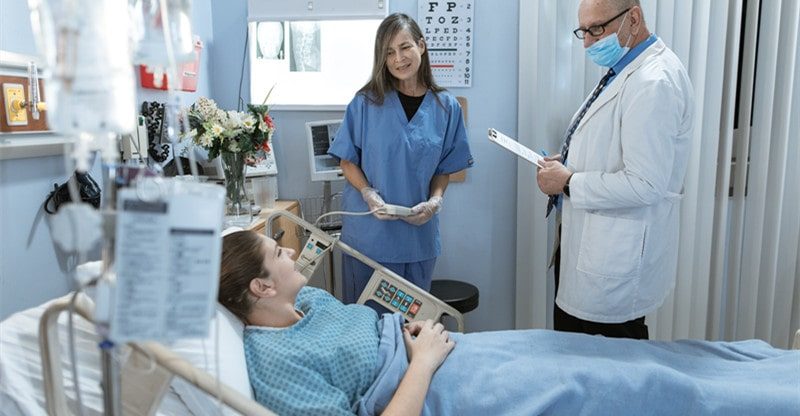Healthcare Fields in Need of Multilingual Workers
There is significant demand for healthcare professionals nationwide. The same holds for multilingual healthcare workers.
Multilingual healthcare workers can communicate and collaborate with patients who don’t speak English. In doing so, these workers can provide preventative and emergency treatments to patients who would otherwise have difficulty being understood.
For those who speak multiple languages and want to pursue a healthcare career or advance their existing one, opportunities are available in several fields, including:
Medical Assistant (MA)
Medical assistants handle front- and back-office tasks in hospitals, physicians’ offices, and other healthcare facilities. These assistants schedule appointments, file paperwork, and complete other administrative tasks. They also gather patient medical history information, measure basic vital signs, and perform various clinical duties.
An MA communicates directly with patients. Thus, a multilingual MA is well-equipped to collect patient information, so he or she can receive an accurate diagnosis. And with this information at their disposal, a doctor can provide their patient with safe and effective treatment, too.
Registered Nurse (RN)
RNs are licensed medical professionals who perform myriad health-related tasks. An RN’s responsibilities vary based on their facility, specialty, and patient. They can include everything from providing basic care and comfort to a patient to administering treatment.
A typical RN spends more time communicating with patients than a doctor. He or she focuses on learning about the patient and gaining their trust. Additionally, an RN communicates with patients regarding their medical care. Therefore, a bilingual RN can educate a patient regarding treatment. Plus, he or she can ensure the patient is fully supported throughout a treatment plan.
Pharmacy Technician
Pharmacy technicians work closely with pharmacists and patients. They verify a prescription is correct before it is given to a patient. Furthermore, pharmacy techs process insurance claims, file paperwork, and handle other pharmacy administrative responsibilities.
A pharmacy tech works outside of a hospital or other healthcare facilities. As such, it can be difficult for a pharmacy tech to access a translator to communicate with a patient who does not speak English.
Conversely, a multilingual pharmacy tech can respond to a non-English speaking patient’s concerns and questions regarding a prescription. That way, the tech can help the patient properly use a prescription and ensure he or she gets the best results out of it.
Physician Assistant (PA)
PAs can diagnose illnesses, develop and maintain treatment plans, and prescribe medications. They receive thousands of hours of medical training. This ensures PAs possess a comprehensive skill set and can improve healthcare access and quality.
Multilingual PAs can keep the lines of communication with non-English speaking patients. They can meet with these patients in emergency rooms and urgent care centers and immediately provide them with medical care and support. The latter is becoming the go-to healthcare facility for patients without insurance or in rural areas, thus often, so socioeconomic circumstances, a bilingual provider would be an asset.
Reasons to Become a Multilingual Healthcare Worker
Speaking multiple languages can be beneficial for healthcare workers and patients. There are several reasons why this is the case.
First, language can be the difference between life and death. If a patient cannot share their medical concerns and issues with a healthcare worker, there is no guarantee this individual can receive proper diagnosis and treatment. There is a risk that the healthcare worker could run out of time to treat the patient before their medical issue escalates as well.
A multilingual healthcare worker can quickly address a non-English speaking patient’s concerns and questions. The worker can then help the patient receive appropriate diagnosis and treatment and guard against long-term health issues or death.
Moreover, a multilingual worker offers invaluable skills that make him or her a key contributor in underserved communities. This worker can ensure patients in non-English speaking communities can receive adequate medical care and support. He or she can maintain ongoing communication with these patients and verify their treatments are successful, too.
As a result, the worker can improve patient outcomes in underserved communities.
Also, multilingual healthcare workers can break down cultural barriers with patients. These workers can speak the same language as patients and understand the problems they face. From here, they can establish positive relationships with patients. And together, multilingual healthcare workers and their patients can achieve shared goals.
How to Become a Multilingual Healthcare Worker
Those who want to become bilingual healthcare workers can enroll in college and university degree programs. For individuals who are already fluent in a second language, they can pursue a degree in the medical field of their choice. Or, those who want to learn a second language and a medical degree can earn both at the same time. Meanwhile, current healthcare workers can sign up for foreign language classes.
Keep in mind that incentives are available to those who want to pursue medical job opportunities or advance their healthcare career. These incentives can help individuals cover some or all of the cost of healthcare education programs.
Finally, work diligently to become a multilingual healthcare worker and strive for ongoing improvement. With hard work, patience, and persistence, anyone can succeed as a multilingual healthcare worker.



